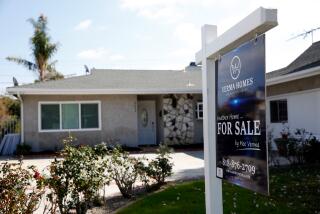The effect of war on the home front
By all accounts, 2002 was a great year for real estate. Existing and new home sales soared, interest rates were low and rising prices added equity wealth to homeowners’ portfolios. But how could 2003 home buying and selling decisions be affected if the U.S. goes to war with Iraq?
Regardless of whether there is a war, Ed Leamer, director of the UCLA Anderson Forecast, said people who already own homes should not be overly concerned about their property values.
“I don’t think the economy or the real estate sector, in particular, will be affected by a war one way or another,” Leamer said. “For people who already own their homes, I think their money is in a good place.”
Although he doesn’t expect housing to appreciate at the same clip as in 2001 and 2002, he said homeowners locked in to low mortgage rates are in a good position.
During the Persian Gulf War, the average rate on a 30-year mortgage hit 9.84% when Iraq invaded Kuwait on Aug. 2, 1990, increased to 10.04% that September and dropped to 9.55% by the time U.S. warplanes attacked Baghdad on Jan. 17, 1991, according to statistics compiled by Bankrate.com. Mortgage rates then increased slightly after the February 1991 cease-fire, dipped in the summer and continued to fall for the next two years.
But there isn’t much room for current 30-year fixed-rate mortgages, which posted record lows last year before stabilizing at about 6%, to drop. In fact, the Mortgage Bankers Assn. of America expects fixed-rate mortgages to increase to 6.8% by year’s end.
The true economic effect of a war will be determined by the conflict’s cost, duration and the wear-effect on investor and consumer confidence, said David Lereah, chief economist for the National Assn. of Realtors.
Although no one can pinpoint the cost of a war with Iraq, some experts place an engagement of less than six months at about $50 billion. If the fighting lasts longer than one year, costs could reach $140 billion. And annual occupational and peacekeeping efforts are estimated at $17 billion to $45 billion. In comparison, the Persian Gulf War cost about $61 billion and lasted 42 days.
Southern California housing markets with strong defense-related industries -- including Palmdale, the west San Fernando Valley, the South Bay, central Orange County, San Diego and the Antelope Valley -- could benefit from war expenditures, according to Jack Kyser, chief economist for the Los Angeles County Economic Development Corp. In the event of war, Kyser anticipates employment spikes in engineering, intelligence gathering, software development and advanced manufacturing sectors.
“The defense buildup and homeland security effort is going to provide a lot of unexpected regional support in 2003 and 2004,” Kyser said. “It looks like we are going to see a fairly solid housing market locally. The population is growing. And we still have a shortage of affordable housing in the region.”
Despite the potential rebound effect, Doug Duncan, senior vice president and chief economist for the Mortgage Bankers Assn. of America, said a prolonged war could diminish consumer confidence and inhibit buying decisions on homes, cars and other big-ticket items.
“Consumers may be more conservative in a war environment,” Duncan said, “especially if the war goes for a longer period and generates significant casualty rates.”
But Alex Perriello, president and chief executive of Coldwell Banker Real Estate Corp., offered a different perspective.
“If you look at what happened in Los Angeles during the 1990s, what really challenged the California real estate market was not so much the Gulf War but the Berlin Wall coming down and the end of the Cold War, which resulted in cutbacks in military spending,” Perriello said. “So peace had a more negative impact on the California market than the Gulf War did.”
Historically, economists say major wars have fueled more booms than recessions. In World War II, for instance, defense spending reportedly helped catapult the sluggish U.S. economy.
The recession that followed the Persian Gulf War lasted nine months, ending in March 1991. However, the current economic slowdown began in March 2001, and most experts predict that a short war would have a negligible effect on the recent economic recovery.
Of course, major destruction of oil facilities in the Middle East by Iraqi forces, such as happened in Kuwait during the Persian Gulf War, could dramatically alter that viewpoint.
“During the Gulf War, oil prices went up to $40 a barrel. That increases inflationary pressures, which increases interest rates and mortgage rates and dampens the demand for home buying,” Lereah said.
The oil question may be worrying for some, but a recent UCLA Anderson Forecast survey found that only 27% of Americans think a potential war with Iraq poses a great risk to the national economy. A falling stock market, weaknesses in technology spending and domestic terrorism account for the majority of the fears.
War or no war, Leamer expects the California housing market to weaken in 2003. He blamed the trend on the previous year’s accelerated buying patterns.
“In both housing and autos, we have stolen a lot of sales from the future,” Leamer said. “Basically, anybody who had ideas about buying a home in the next five years has felt compelled to lock in a low mortgage rate and buy a home.”
Michelle Hofmann is a Los Angeles freelance writer. She can be reached at michellehofmann@earthlink.net.
More to Read
Inside the business of entertainment
The Wide Shot brings you news, analysis and insights on everything from streaming wars to production — and what it all means for the future.
You may occasionally receive promotional content from the Los Angeles Times.










